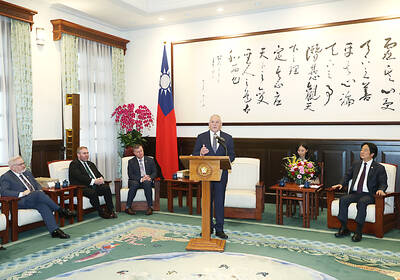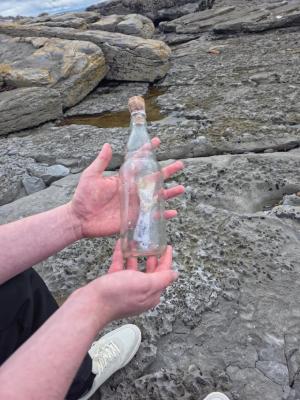The Centers for Disease Control (CDC) has developed a test kit that can diagnose whether someone is infected with swine flu within six hours, an official said yesterday.
CDC Deputy Director-General Shih Wen-yi (施文儀) demonstrated how the kit works and the procedure for the diagnostic test at the CDC-run Kunyang laboratory in Taipei.
Shih said that the Department of Health (DOH) acquired the key DNA sequence of the new virus strain on April 25 from the US Centers for Disease Control and Prevention and two days later obtained the RNA of the virus from the Miaoli-based Animal Technology Institute of Taiwan.
Using this information, the DOH was able to develop and produce the quick-test kit, which will be distributed for use by the government and some laboratories, Shih said.
Taiwan’s quarantine authorities began to make on-board checks of passengers on flights arriving from Canada and the US on Wednesday in an effort to stop the disease, which has spread to 11 countries since it emerged in Mexico last month, from spreading to Taiwan.
Three categories are used to describe the status of potential infection: under investigation, probable case and confirmed case, and the test kit will be used in the first stage of diagnosis, Shih said.
If someone tests positive using the kit, a laboratory will then conduct virus isolation and virus antibody testing to obtain a more accurate diagnosis, he said.
As of yesterday, 12 out of 18 cases of people suspected to be infected with swine flu had tested negative for the virus.
Final results for the remaining six people, who recently arrived from North America, were not yet available.
Shih said that the CDC would stage an exercise at Taipei Songshan Airport today to simulate how an individual suspected of swine flu would be escorted from the airport to the Taipei Municipal Hoping Hospital.
“We need to demonstrate to the public how a suspect swine case will be taken care of,” he said.
Shih said the tests would be carried out at Songshan instead of Taiwan Taoyuan International Airport because the public and the media have questioned safety measures at the airport, which sees the second-largest amount of arrivals from China.
Meanwhile, Premier Liu Chao-shiuan (劉兆玄) inspected the CDC’s storehouse for disease prevention equipment yesterday afternoon.
The CDC has a store of masks that could be distributed to the public if necessary, he said.
“Masks and other disease prevention equipment can be distributed to anywhere in Taiwan proper within 24 hours, and to outlying islands within 48 hours. There is no need for people to buy them in a panic,” Liu said.
Liu said the government would enforce the Communicable Disease Prevention and Control Act (傳染病防治法) to prevent the hoarding of masks.
Under Article 61 of the act, hoarding medical equipment is punishable by one to seven years in prison and up to NT$5 million (US$150,000) in fines.
Taiwan High Court Prosecutors’ Office Chief Yen Da-ho (顏大和) said that prosecutors have been asked to investigate whether any businesses were trying to illegally profit by raising the price of related medical items.
ADDITIONAL REPORTING BY SHIH HSIU-CHUAN

FINAL COUNTDOWN: About 50,000 attended a pro-recall rally yesterday, while the KMT and the TPP plan to rally against the recall votes today Democracy activists, together with arts and education representatives, yesterday organized a motorcade, while thousands gathered on Ketagalan Boulevard in Taipei in the evening in support of tomorrow’s recall votes. Recall votes for 24 Chinese Nationalist Party (KMT) lawmakers and suspended Hsinchu City mayor Ann Kao (高虹安) are to be held tomorrow, while recall votes for seven other KMT lawmakers are scheduled for Aug. 23. The afternoon motorcade was led by the Spring Breeze Culture and Arts Foundation, the Tyzen Hsiao Foundation and the Friends of Lee Teng-hui Association, and was joined by delegates from the Taiwan Statebuilding Party and the Taiwan Solidarity

‘NON-RED’: Taiwan and Ireland should work together to foster a values-driven, democratic economic system, leveraging their complementary industries, Lai said President William Lai (賴清德) yesterday expressed hopes for closer ties between Taiwan and Ireland, and that both countries could collaborate to create a values-driven, democracy-centered economic system. He made the remarks while meeting with an Irish cross-party parliamentary delegation visiting Taiwan. The delegation, led by John McGuinness, deputy speaker of the Irish house of representatives, known as the Dail, includes Irish lawmakers Malcolm Byrne, Barry Ward, Ken O’Flynn and Teresa Costello. McGuinness, who chairs the Ireland-Taiwan Parliamentary Friendship Association, is a friend of Taiwan, and under his leadership, the association’s influence has grown over the past few years, Lai said. Ireland is

Instead of threatening tariffs on Taiwan-made chips, the US should try to reinforce cooperation with Taiwan on semiconductor development to take on challenges from the People’s Republic of China (PRC), a Taiwanese think tank said. The administration of US President Donald Trump has threatened to impose across-the-board import duties of 32 percent on Taiwan-made goods and levy a separate tariff on semiconductors, which Taiwan is hoping to avoid. The Research Institute for Democracy, Society, and Emerging Technology (DSET), a National Science and Technology Council think tank, said that US efforts should focus on containing China’s semiconductor rise rather than impairing Taiwan. “Without

An SOS message in a bottle has been found in Ireland that is believed to have come from the Taiwanese captain of fishing vessel Yong Yu Sing No. 18 (永裕興18號), who has been missing without a trace for over four years, along with nine Indonesian crew members. The vessel, registered to Suao (蘇澳), went missing near Hawaii on Dec. 30, 2020. The ship has since been recovered, but the 10 crew members have never been found. The captain, surnamed Lee (李), is believed to have signed the note with his name. A post appeared on Reddit on Tuesday after a man